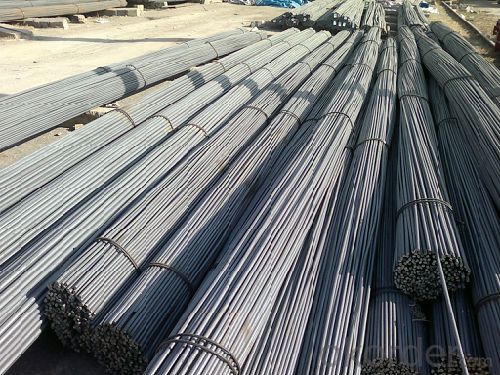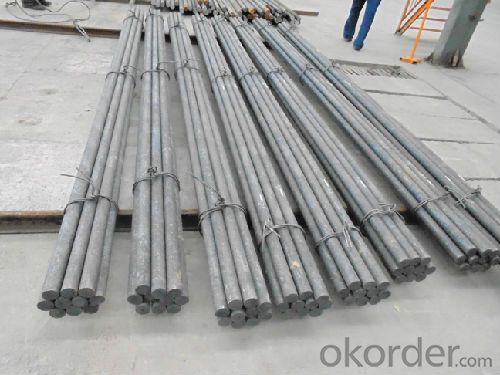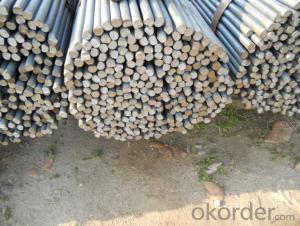Hot Rolld Steel Round Bars with Variety Grade
- Loading Port:
- Tianjin
- Payment Terms:
- TT or LC
- Min Order Qty:
- 200 m.t.
- Supply Capability:
- 30000 m.t./month
OKorder Service Pledge
OKorder Financial Service
You Might Also Like
OKorder is offeringHot Rolld Steel Round Bars with Variety Grade at great prices with worldwide shipping. Our supplier is a world-class manufacturer of steel, with our products utilized the world over. OKorder annually supplies products to African, South American and Asian markets. We provide quotations within 24 hours of receiving an inquiry and guarantee competitive prices.
Product Applications:
Hot Rolld Steel Round Bars with Variety Grade are ideal for structural applications and are widely used in the construction of buildings and bridges, and the manufacturing, petrochemical, and transportation industries.
Product Advantages:
OKorder's Hot Rolld Steel Round Bars with Variety Grade are durable, strong, and wide variety of sizes.
Main Product Features:
· Premium quality
· Prompt delivery & seaworthy packing (30 days after receiving deposit)
· Can be recycled and reused
· Mill test certification
· Professional Service
· Competitive pricing
Product Specifications:
Manufacture: Hot rolled
Grade: Q195 – 235
Size: 8MM~50MM
Certificates: ISO, SGS, BV, CIQ
Length: 6m – 12m, as per customer request
Packaging: Export packing, nude packing, bundled
FAQ:
Q1: How do we guarantee the quality of our products?
A1: We have established an advanced quality management system which conducts strict quality tests at every step, from raw materials to the final product. At the same time, we provide extensive follow-up service assurances as required.
Q2: How soon can we receive the product after purchase?
A2: Within three days of placing an order, we will arrange production. The normal sizes with the normal grade can be produced within one month. The specific shipping date is dependent upon international and government factors, the delivery to international main port about 45-60days.
Q3: what is the difference between actual weight and theoretical weight?
A3: All the section steel has two weights: actual weight and theoretical weight. Actual weight is the weighing out when the product delivered from the mill. Theoretical weight is calculated by pieces. The invoice can be based on each of them as your request.
Images:


- Q:Can the same grade steel instead of round bar be ok?
- Physical and mechanical properties are different. Because of the different chemical composition and strength of reinforcing steel, they are different in physical and mechanical properties. The cold bending property of steel is good, can make the hook 180, screw steel can only make straight hook 90 degrees; steel weldability is good, with ordinary carbon steel electrode can be used to low alloy electrode; anti fatigue performance and toughness in steel bar is good.
- Q:What are the different types of threads used for steel round bars?
- The usage of various thread types for steel round bars depends on the specific application and requirements. The most common thread types for steel round bars are as follows: 1. Unified National Coarse (UNC) Thread: This thread type is widely utilized for general-purpose applications and offers a relatively coarse pitch. It is suitable for most common applications that do not demand high strength. 2. Unified National Fine (UNF) Thread: UNF threads have a finer pitch compared to UNC threads and provide better resistance to vibration. They are commonly employed in applications that require a higher level of thread engagement and improved thread performance. 3. Metric Thread: Metric threads are prevalent in countries that adopt the metric system. They are characterized by their pitch, which determines the distance between each thread. Metric threads offer a precise and standardized threading solution for diverse applications. 4. Acme Thread: Acme threads possess a trapezoidal shape and find frequent use in applications necessitating high strength and resistance to wear and tear. They are often employed in heavy-duty machinery like lead screws, jackscrews, and power transmission systems. 5. Buttress Thread: Buttress threads have a triangular shape, with one side perpendicular to the thread axis. This unique design enables them to bear high loads and resist axial forces in a specific direction. Buttress threads are commonly found in applications involving high-pressure fluid flow, such as hydraulic cylinders and pumps. 6. Whitworth Thread: Whitworth threads were extensively used in the past but have become less common in modern times. They have a rounded profile and a coarse pitch. Whitworth threads can still be found in older machinery and equipment. Choosing the appropriate thread type for a specific application is crucial to ensure the proper fit, functionality, and durability of the steel round bar. Factors such as load requirements, environmental conditions, compatibility with mating parts, and industry standards will determine the suitable thread type for a given situation.
- Q:How are steel round bars used in the manufacturing of conveyor systems?
- Steel round bars are commonly used in the manufacturing of conveyor systems due to their durability and strength. These bars are often used as the main structural components for conveyor belts, rollers, and pulleys. In conveyor systems, the steel round bars are typically used to form the framework or support structure of the conveyor. They are used to create the main body of the conveyor, providing stability and strength to withstand the weight and movement of the materials being transported. For instance, steel round bars are often used to create the conveyor belt support structure. These bars are typically bent or welded into a circular shape to form the rollers or idlers that support the conveyor belt. The bars are usually spaced evenly along the length of the conveyor, providing a stable platform for the belt to move on. Additionally, steel round bars are also used to create the pulleys that drive the conveyor belt. These pulleys are typically made of a solid steel round bar, which is machined to the desired size and shape. The pulleys are then mounted on the conveyor system and connected to a motor or other power source, which allows them to rotate and move the conveyor belt. Overall, steel round bars play a crucial role in the manufacturing of conveyor systems by providing the necessary strength and stability required for efficient material handling. Their durability and resistance to wear and tear make them a suitable choice for the demanding conditions of conveyor applications.
- Q:Can steel round bars be used in the manufacturing of electrical components?
- Yes, steel round bars can be used in the manufacturing of electrical components. Steel is a commonly used material in various industries due to its strength, durability, and electrical conductivity. Steel round bars can be shaped, cut, and machined to form different components such as connectors, terminals, and housings for electrical devices. Additionally, steel's corrosion resistance and affordable cost make it a practical choice for manufacturing electrical components.
- Q:What are the different types of steel round bar alloys for improved corrosion resistance?
- There are several different types of steel round bar alloys that offer improved corrosion resistance. Some common examples include stainless steel alloys such as 304, 316, and 410, which contain chromium and nickel to create a protective layer against corrosion. Additionally, weathering steel alloys like ASTM A588 and A709 are known for their ability to develop a rust-like appearance that acts as a protective barrier. Other options include duplex stainless steels, which combine the benefits of austenitic and ferritic alloys, and high-alloy steels like Inconel and Hastelloy, which are highly resistant to corrosion in extreme environments.
- Q:What is the maximum length of a steel round bar that can be produced?
- Various factors, including the manufacturing process, equipment size and capacity, and logistical constraints, dictate the maximum length of a steel round bar. Typically, steel round bars can range from a few feet to several hundred feet in length. However, it is important to acknowledge that longer lengths may have certain limitations or considerations. For instance, hot rolling mills often determine the maximum length of a steel round bar based on the size and capacity of the rolling mill. The bar's length must fall within a range that the machinery can effectively roll and process. Additionally, transportation and handling logistics can also impose restrictions on the maximum length of a steel bar. Longer bars may necessitate specialized equipment or meticulous planning to ensure safe and efficient movement. Consequently, considering the specific production capabilities and constraints of the steel manufacturer or supplier becomes crucial when determining the maximum length of a steel round bar that can be produced.
- Q:What are the advantages of using nickel-chromium-silicon alloy steel round bars?
- There are several advantages of using nickel-chromium-silicon alloy steel round bars: 1. High temperature resistance: Nickel-chromium-silicon alloy steel round bars have excellent resistance to high temperatures, making them ideal for applications that involve exposure to extreme heat. They can withstand temperatures up to 1200°C without losing their strength or structural integrity. 2. Corrosion resistance: These alloy steel round bars have good corrosion resistance, particularly in environments where they are exposed to acids, alkalis, and other corrosive substances. This makes them suitable for use in industries such as chemical processing, oil and gas, and marine applications. 3. High strength and durability: Nickel-chromium-silicon alloy steel round bars have high tensile strength and toughness, which allows them to withstand heavy loads and resist deformation. They are known for their exceptional durability and long service life, even under demanding conditions. 4. Excellent mechanical properties: These alloy steel round bars exhibit excellent mechanical properties, including good ductility, impact resistance, and fatigue strength. This makes them suitable for various applications that require high performance and reliability, such as structural components, machine parts, and tools. 5. Ease of fabrication: Nickel-chromium-silicon alloy steel round bars can be easily machined, welded, and formed into various shapes and sizes. This allows for greater design flexibility and ease of fabrication, making them a preferred choice for manufacturers. 6. Cost-effective: Despite their numerous advantages, nickel-chromium-silicon alloy steel round bars are relatively cost-effective compared to other high-performance materials. Their long service life and resistance to wear and tear make them a cost-efficient choice in the long run, as they reduce the need for frequent replacements and maintenance. Overall, the advantages of using nickel-chromium-silicon alloy steel round bars make them an excellent choice for applications that require high temperature resistance, corrosion resistance, strength, durability, and ease of fabrication.
- Q:What are the advantages of using nickel-tin alloy steel round bars?
- There are several advantages of using nickel-tin alloy steel round bars. Firstly, nickel-tin alloy steel has excellent corrosion resistance properties. This makes it ideal for applications where the round bars will be exposed to harsh environments or corrosive substances. The addition of nickel and tin enhances the overall durability and longevity of the round bars, ensuring they can withstand prolonged exposure to moisture, chemicals, and other corrosive elements. Secondly, nickel-tin alloy steel round bars offer superior strength and toughness. The combination of nickel and tin in the alloy composition enhances the overall mechanical properties of the bars, making them highly resistant to deformation, bending, and breaking. This makes them suitable for demanding applications that require high strength and durability, such as in construction, aerospace, and automotive industries. Additionally, nickel-tin alloy steel round bars exhibit excellent heat resistance. They can withstand high temperatures without significant loss of strength or deformation. This makes them ideal for applications that involve exposure to elevated temperatures, such as in furnaces, boilers, and heat exchangers. Furthermore, nickel-tin alloy steel is known for its excellent electrical conductivity. This property makes the round bars suitable for applications that require efficient electrical transmission, such as in electrical wiring, power generation, and electrical equipment manufacturing. Lastly, nickel-tin alloy steel round bars are relatively easy to machine and fabricate. They can be readily shaped, cut, and welded, allowing for versatility in various manufacturing processes. This ease of machining and fabrication ensures efficient production and reduces overall manufacturing costs. In conclusion, the advantages of using nickel-tin alloy steel round bars include excellent corrosion resistance, superior strength and toughness, high heat resistance, good electrical conductivity, and ease of machining and fabrication. These properties make nickel-tin alloy steel round bars a preferred choice for a wide range of applications in various industries.
- Q:Can steel round bars be heat treated for improved strength?
- Yes, steel round bars can be heat treated to improve their strength. Heat treatment involves heating the steel to a specific temperature and then cooling it rapidly or slowly, depending on the desired outcome. This process can alter the microstructure of the steel, resulting in increased hardness, tensile strength, and other mechanical properties.
- Q:Are steel round bars suitable for high-pressure applications?
- Steel round bars are frequently a good choice for high-pressure applications. Steel is renowned for its strength and durability, making it an ideal material for handling high pressure. Round bars, in particular, possess exceptional tensile strength and resistance to deformation, rendering them suitable for utilization in high-pressure settings like hydraulic systems, oil and gas pipelines, and structural applications. Furthermore, steel round bars can be customized to meet specific strength and hardness criteria, further enhancing their aptness for high-pressure applications. Nevertheless, it is crucial to carefully consider the requirements of the particular application and seek advice from an engineer or industry expert to guarantee the selection of the most appropriate grade and size of steel round bar for optimal performance and safety.
1. Manufacturer Overview |
|
|---|---|
| Location | |
| Year Established | |
| Annual Output Value | |
| Main Markets | |
| Company Certifications | |
2. Manufacturer Certificates |
|
|---|---|
| a) Certification Name | |
| Range | |
| Reference | |
| Validity Period | |
3. Manufacturer Capability |
|
|---|---|
| a)Trade Capacity | |
| Nearest Port | |
| Export Percentage | |
| No.of Employees in Trade Department | |
| Language Spoken: | |
| b)Factory Information | |
| Factory Size: | |
| No. of Production Lines | |
| Contract Manufacturing | |
| Product Price Range | |
Send your message to us
Hot Rolld Steel Round Bars with Variety Grade
- Loading Port:
- Tianjin
- Payment Terms:
- TT or LC
- Min Order Qty:
- 200 m.t.
- Supply Capability:
- 30000 m.t./month
OKorder Service Pledge
OKorder Financial Service
Similar products
New products
Hot products
Related keywords































